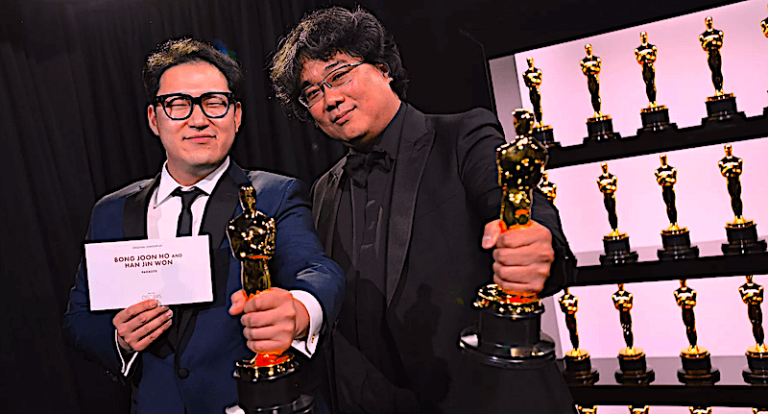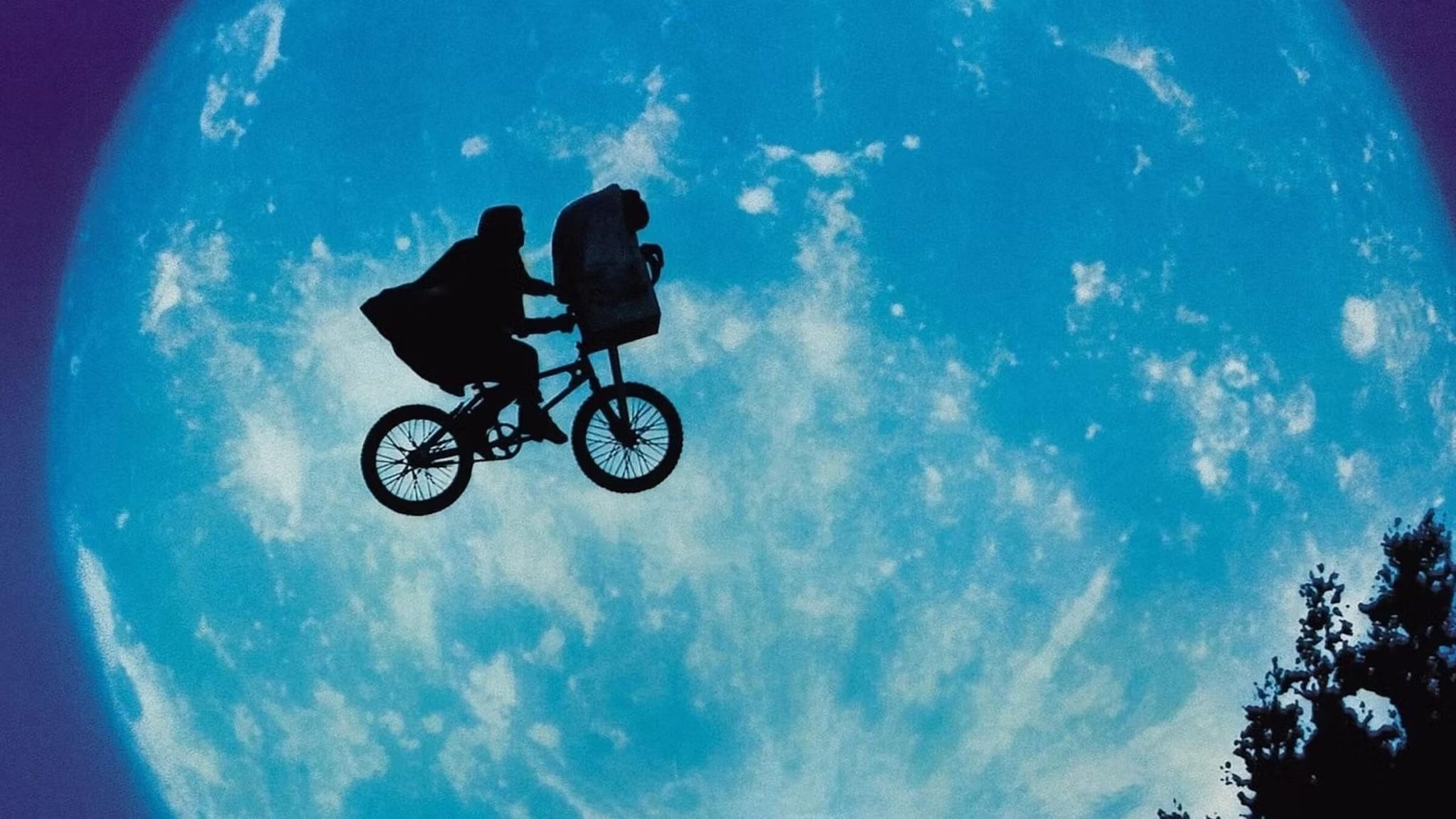What the PARASITE Script Can Teach Screenwriters (and Hollywood)

What can screenwriters — and Hollywood — learn from the Oscar-winning screenplay Parasite?
Beware Spoilers: We will be discussing the screenplay of the film and divulging plot points and many elements that those who haven't seen the film should discover organically while watching it. If you've seen the film, continue on. If you haven't, keep reading with the knowledge that the film's various twists and turns will be spoiled. We highly suggest you experience the film yourself first.
Parasite shocked the film industry on Oscar night, earning Academy Awards for Best Original Screenplay, Best International Film, Best Director, and Best Picture.
Written by the film's director, Bong Joon-ho, and his former production assistant (on Bong's critically-heralded film Snowpiercer) Han Jin-won, the film made history as the first Best Original Screenplay winner and Best Picture winner from an Asian writer, director, and producer.
The concept for Parasite was imagined and developed by Bong in 2013 while directing Snowpiercer.
A theater-actor friend encouraged Bong to write a play. While searching for subject material for a possible turn at becoming a playwright, Bong looked back into his life as a tutor for the son of a wealthy family in Seoul.
The more he developed the story, the more he realized that he was envisioning it with camera angles and movements — he knew it had to be a film.
After Snowpiercer, Bong wrote a 15-page film treatment that told the first half of the story.
Bong has admitted that screenwriting can be agonizing for him — and his family. This may have been the reason that he gave Jim Wan Hon — then a production assistant on Snowpiercer — the treatment with the hope that Han would write the script.
After Han wrote three drafts of the story in script form, Bong came back to the story after finishing his film Okja and finished the Parasite script.
In 2018, production was underway, officially wrapping in September of that same year.
It was released in the United States in October of 2019 after debuting at the Cannes Film Festival that May.
With a strong 99% rating on Rotten Tomatoes, the film went on to garner rave reviews, outstanding box-office receipts, and now four ground-breaking Academy Award wins.
Here we feature the best lessons the screenplay can teach screenwriters, and then delve into what Hollywood itself can learn from this masterpiece as well.
Use What You Know
The old adage of "write what you know" has long haunted budding screenwriters — "What does it mean? Are you supposed to only write stories that you've experienced first-hand, or does it mean that you should be looking to your life for inspiration while creating scenes, characters, and concepts?"
When Bong challenged himself to find another story to tell, what did he do? He looked back upon his life and remembered his experience of being a tutor for the son of a wealthy family.
Anyone that has seen the film knows that this is a central plot point. However, the story is far more than that.
Instead of writing what you know, you should focus on the more simple mindset of using what you know to write compelling and engaging stories, moments, and characters.
While it's true that if you have lived through an intriguing true story, you should, by all means, tell it. But you should be more centered on finding moments, emotions, and experiences that you identify with and applying them to original concepts for screenplays. Use what you know.
Bong took his real-life experience and used it as a central core to an otherwise fantastical tale.
When you're developing your stories and characters, don't turn to the stock plots and characterizations that you've seen endlessly in movies. Instead, turn inward and try to find elements that you have personal connections with and use them in any way, shape, or form. That is what will drive you to tell stories that have more of an emotional impact.
Looking for a story frame to hang your experience on? Check out this free eBook for available properties!
Comedy Needs Drama — Drama Needs Comedy
You can't call Parasite a comedy. You can't call it a drama either. It's both. And that is what is so engaging about the screenplay.
It can make you laugh on one page, and then channel empathetic and cathartic reactions through drama and tension on the next.
This story is a tragedy. It handles dramatic elements of social inequality, poverty, and desperation. It touches on both social and political issues. And it is embedded with violence, death, and tragic loss.
But it's funny.
This tragedy has the hijinks of slapstick and situational comedy.
What that can teach you about screenwriting is that drama needs comedy, and comedy needs drama. They enhance each other.
When a script reader is reading heavy drama, comedy can lift them out of the despair on the pages. When a script reader is reading hilarious comedy, drama can offer a more cathartic experience beyond the situational laughs and jokes.
Do whatever you can to bring moments of comedy into your otherwise non-comedic screenplays. And if you're writing something hilarious, never forget that audiences still want to feel empathy and catharsis for the characters.
Challenge the Structures and Archetypes
A protagonist goes up against a conflict as an antagonist works against them. That's the general consensus for a feature screenplay story.
Parasite challenges the structures and archetypes that we're used to.
There is no clear antagonist in this screenplay. Every character is someone that we can empathize with.
Ki-taek (father), Chung-sook (mother), Ki-jung (daughter), and Ki-woo (son) can be perceived as protagonists and antagonists — and you can throw the term antiheroes into the equation of the script as well.
This family takes on a parasitic role within the story. They are sucking money from a rich family. However, the rich family is just as parasitic, sucking the labor from the poor as they are seemingly unable to do the most simple of tasks, such as making meals, cleaning the house, and driving themselves to and from work.
Every character within this screenplay — and their accompanying story — is worth rooting for. There is no clear villain or antagonist.
When you're developing your stories and characters, you need to challenge the status quo within the art, craft, and business of screenwriting. You need to think outside the box. That is what makes your script stand out among the thousands of others in the script market.
Script readers and industry insiders don't want to read the same old structures and archetypes. They want something fresh and new — something they didn't even know they wanted.
Do What Parasite Does So Well — Evolve the Story Every 10 (or less) Pages
There's a pattern within this screenplay. And it's evident during the viewing of the film as well.
When the story first opens, we're introduced to the Ordinary World of this family. They're poor. Very poor. And they work together to do whatever they can to scrounge together money — and even a free wi-fi signal.

Ten pages into the screenplay, the Call to Adventure happens. Ki-woo is offered the chance to tutor the teenage daughter of a rich family. This moment comes at the best time, just when the family needs the money the most. He works with his family to create fake papers, which introduces us to the thought that they've done this before.
By page 22, the story evolves. Ki-woo is doing well as a tutor but sees that there may be an opportunity within his situation that could benefit his family even more.

He begins to plant seeds within the rich family that will create a need for another caretaker position that they can exploit. His sister, Ki-jung, is brought in under the false identity of an art teacher and therapist for the rich family's youngest child.

Ten pages later on page 33, another opportunity arises for them to exploit the family. They set up the rich father's driver, get him fired, and quickly move to create a false identity for Ki-taek to take on the driver role.

Now they have three incomes being taken from the rich family.
But, yes, ten pages later (page 43), a set-up is in motion to get the rich family's current housekeeper fired so that Chung-sook can infiltrate the rich family in the role.
By page 53, she's settled into the role of their new housekeeper — the whole family has infiltrated the household.
So now they're all getting paid great money from a rich family. But they still have to return to their dump of a basement apartment in the slums.
Until, yes, ten pages later. On page 63, the rich family is leaving for a weekend camping trip. Ki-taek, Chung-sook, Ki-jung, and Ki-woo have the weekend off and decide to take over the house. They eat, drink, and relax — imagining what it would (or will) be like living a life of such luxury.

Just when they've settled, things are shaken up ten pages later on page 73. The former housekeeper arrives, ringing the doorbell.
The story evolves even more. Now there's a clear threat. The whole family of scam artists is in the house, and the housekeeper they swindled out of a job is just outside.
With this jump in the evolution of the story, the conflict is enhanced. By page 81, it's revealed that the old housekeeper had a secret of her own. She was housing her husband in an underground bomb shelter below the house. He's been trapped within. She soon discovers the secret of the family of scam artists.
This kicks the climax into gear with twists, surprises, and turns happening every few pages.
You need to take a lesson from this screenplay — introduce something new every ten pages or less. Take us down a different path. Inject an added conflict that raises the stakes.
The fantastic part of this screenplay — and the eventual film — is that it changes and evolves at a rapid pace from beginning to end.
For a script reader, that's a thrill they rarely experience. For an audience, it's a thrilling and entertaining cinematic experience.
Every ten pages or less, amp up the stakes and build to an amazing climax.
Build Tension in Every Moment, Scene, and Sequence
Parasite is full of tension on almost every page and every minute of screen time. We're constantly waiting for their ploys to be discovered. We're expecting things to go bad or get worse. That is what creates a page-turner. That is what drives the narrative. That is what makes a cinematic story engaging and compelling.
And it works in every genre. Tension enhances comedy, drama, suspense, and thrills. You raise and build tension by injecting unending conflict which continues to raise the stakes higher and higher.
In Parasite, each family member that infiltrates the rich family's world raises the stakes of the story. More and more could go wrong. We feel the tension because we know that the more they infiltrate this family, the tighter the walls around them are.
In your screenplays, find ways to add evolving conflict and raise the stakes in almost every moment, scene, and sequence that you write. Play with the audience's emotions. Keep them on the edge. Be creative and find ways to build tension in every genre and every type of moment, scene, or sequence that you write.
The Biggest Lesson Parasite Teaches Screenwriters (and Hollywood)?
Originality matters. And it is powerful.
Chasing a trend is tempting, yes. But for newcomers, it's impossible to get to that well in time before it has dried out.
Sequels, reboots, and spin-offs can generate revenue, yes. It is a business.
Intellectual Property can reduce risk, yes. Pre-established audiences are nice.
But Parasite proves that original concepts, stories, and characters are very powerful. We've never seen anything like this film before. Audiences are engaged by it.
Screenwriters need to understand that to stand out amongst the crowd, you need original screenplays. For a script reader, it's common to read dozens of scripts that are merely the writer's version of what has been successful before. That's the kiss of death for a screenwriter trying to break through.
Hollywood needs to understand that audiences want original stories. They grow tired of seeing the same old concepts told in ten different ways.
It's great to have what Hollywood (and audiences) are currently looking for in your back pocket. But the scripts that turn heads are those that offer industry insiders and viewers what they didn't know they wanted or needed. And you accomplish that by thinking outside of the box and swinging for the fences with new and original concepts.
Click Below to Download and Read the Oscar-winning Parasite Screenplay now!
Ken Miyamoto has worked in the film industry for nearly two decades, most notably as a studio liaison for Sony Studios and then as a script reader and story analyst for Sony Pictures. He has many studio meetings under his belt as a produced screenwriter, meeting with the likes of Sony, Dreamworks, Universal, Disney, Warner Brothers, as well as many production and management companies. He has had a previous development deal with Lionsgate, as well as multiple writing assignments, including the produced miniseries Blackout, starring Anne Heche, Sean Patrick Flanery, Billy Zane, James Brolin, Haylie Duff, Brian Bloom, Eric La Salle, and Bruce Boxleitner. Follow Ken on Twitter @KenMovies
For all the latest ScreenCraft news and updates, follow us on Twitter, Facebook, and Instagram.
Tags
Get Our Screenwriting Newsletter!
Get weekly writing inspiration delivered to your inbox - including industry news, popular articles, and more!



























